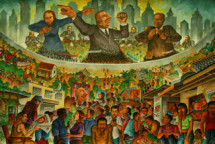Contested spaces, political practices, and Hindutva: Spatial upheaval and authoritarian populism in Noida, India
Temas
Regiones
This paper explores if and how the dynamic of authoritarian populism relates to concrete spaces – as already produced through the process of accumulation – from the grounded vantage of Noida, a city adjacent to New Delhi.

Autores
Contemporary India is showing increasing signs of ‘competitive’ authoritarian populism. The mainstream political discourse in the country is dominated by the sectarian religious forces of Hindu nationalism or Hindutva, serving as the agency of a development narrative that promises to return India to its ‘greatness of yore’. In this paper, we examine the case of Noida, an upcoming satellite township adjacent to the capital New Delhi, to describe a process of spatial upheaval that is leading to continuous practices of ‘othering’. These processes are enabling the Hindutva forces to take root locally. In effect, we argue that local space-making has an intrinsic relationship with authoritarian populism, and it therefore needs to be at the analytical forefront.
This paper was presented at the Emancipatory Rural Politics Initiative (ERPI) 2018 Conference: "Authoritarian Populism and the Rural World"